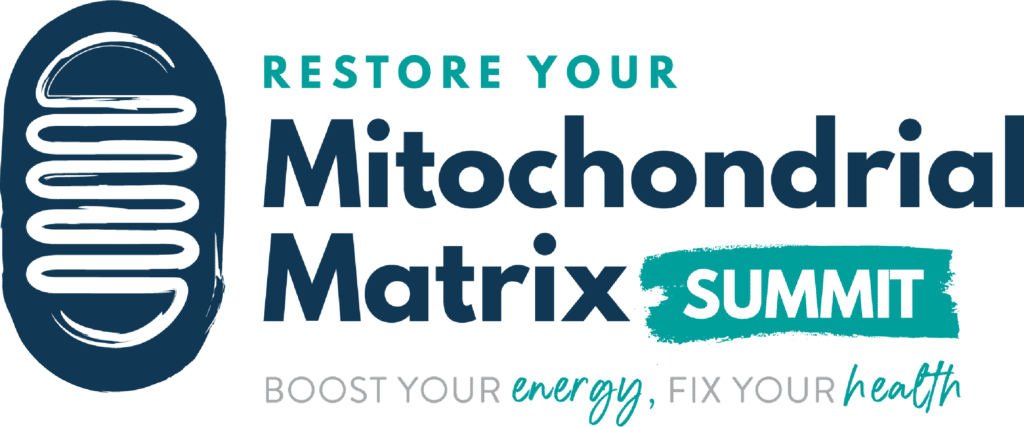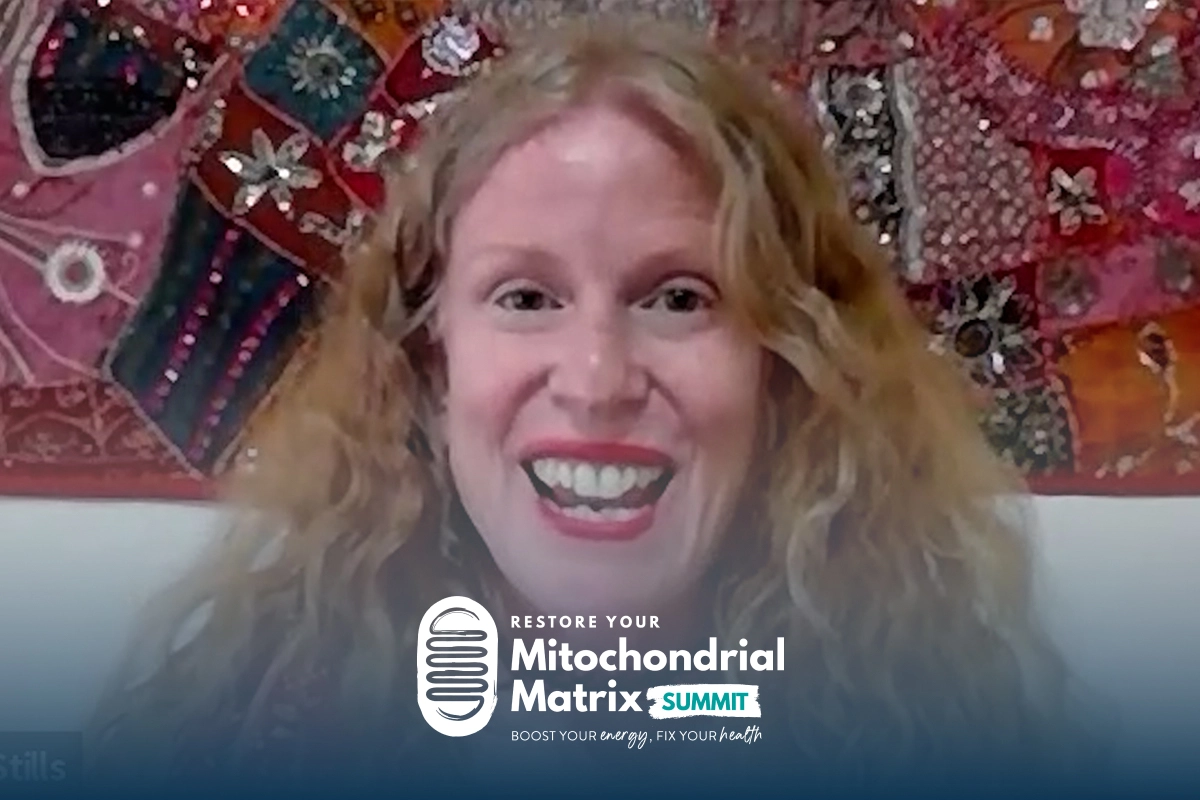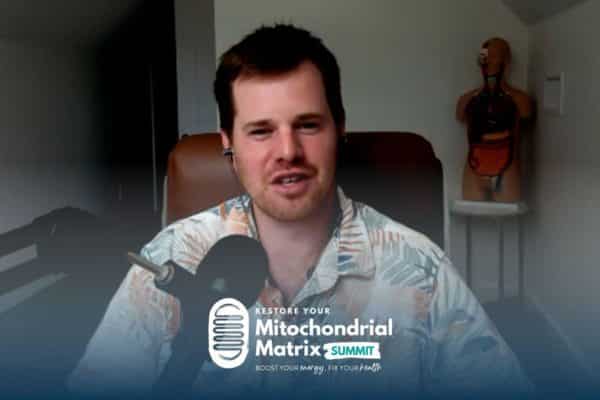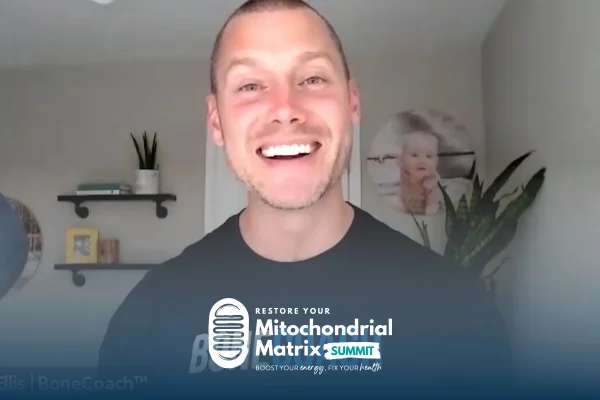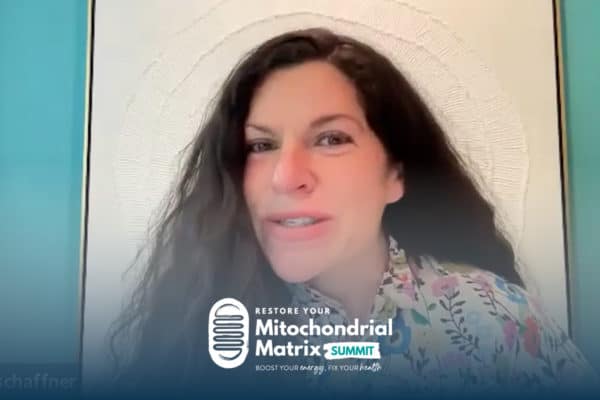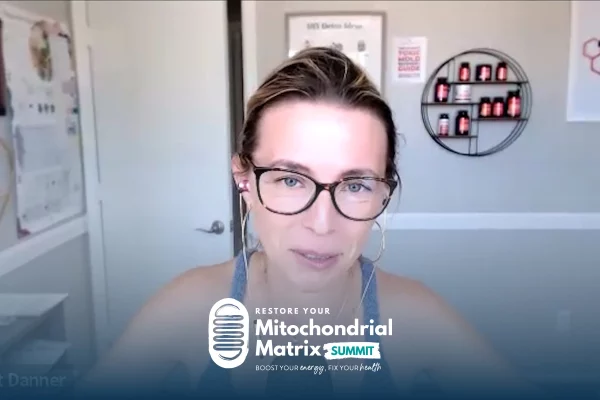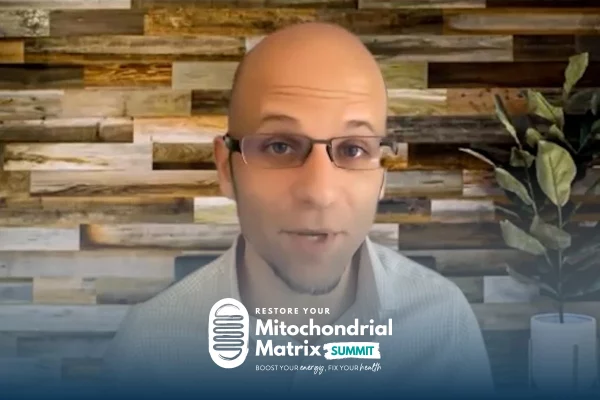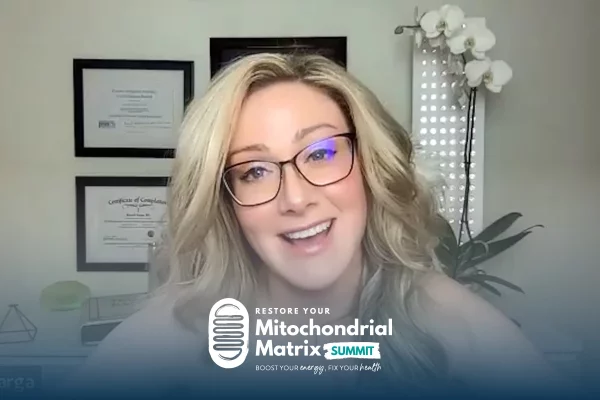Join the discussion below
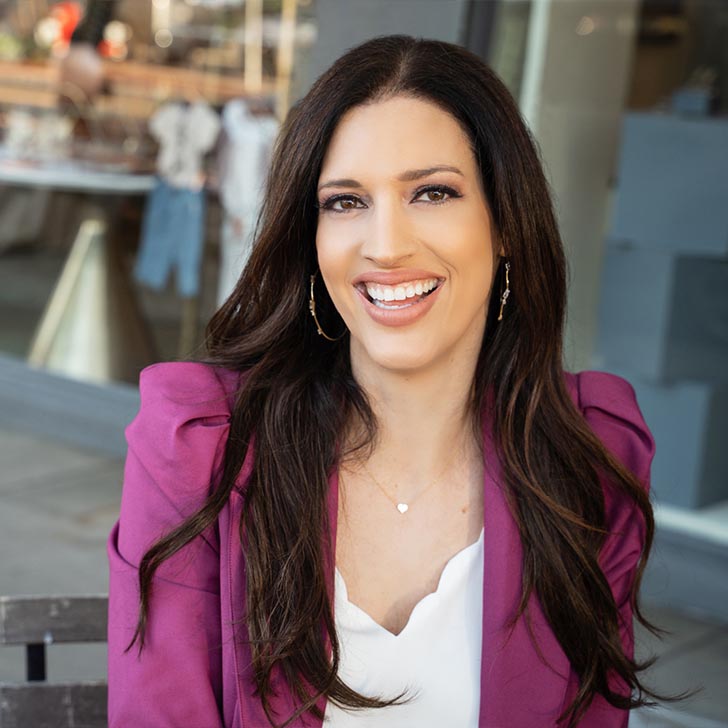
Laura Frontiero, FNP-BC, has served thousands of patients as a Nurse Practitioner over the last 22 years. Her work in the health industry marries both traditional and functional medicine. Laura’s wellness programs help her high-performing clients boost energy, renew mental focus, feel great in their bodies, and be productive again.... Read More
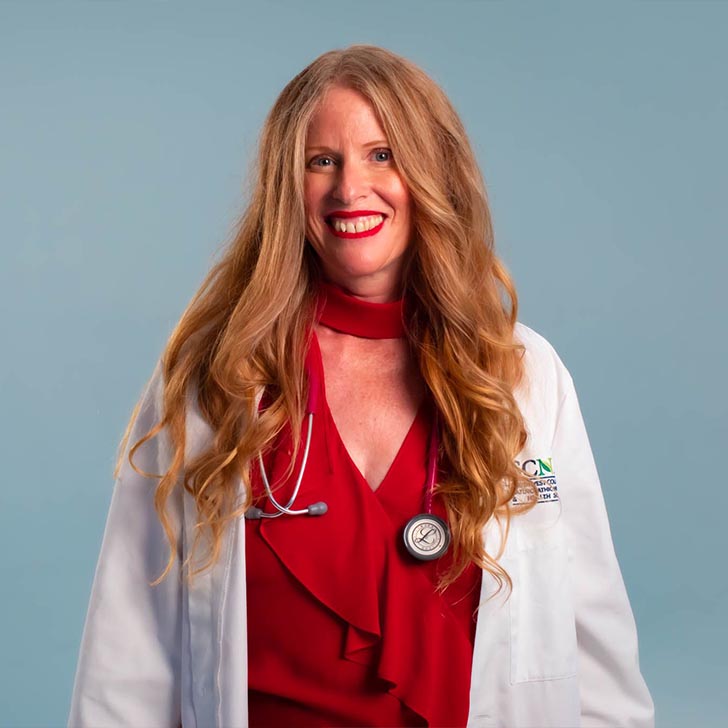
Dr. Sharon Stills, a licensed Naturopathic Medical Doctor with over two decades of dedicated service in transforming women’s health has been a guiding light for perimenopausal and menopausal women, empowering them to reinvent, explore, and rediscover their vitality and zest for life. Her pioneering RED Hot Sexy Meno(pause) Program encapsulates... Read More
- What bioregulatory medicine is, and its relationship to the Mitochondria
- How feminine energy and hormones are related to the Mitochondria health
- How your external environment is related to your internal environment
Related Topics
Ancestral Healing, Bioregulatory Medicine, Chronic Illness, Dental Health, Emotions, Energetics, Energy, Extracellular Matrix, Family Constellation Work, Female Energy, Feminine Energy, Hormonal Harmony, Hormone Health, Matriarchal Lineage, Mitochondria, Mitochondrial Healing, Mother-daughter Relationship, Ph Balance, Self-loveLaura Frontiero, FNP-BC
You’re watching the “Restore Your Mitochondrial Matrix Summit.” I’m your host, Laura Frontiero. I’m bringing you experts to help you boost your energy and fix your health so you can build the life you love. And today, my special guest is Dr. Sharon Stills. Hi Sharon, welcome to the summit.
Dr. Sharon Stills
Hi, thank you. So happy to be here.
Laura Frontiero, FNP-BC
Yes, I’m excited about this interview. Let me tell the audience a little bit about you, and then we’ll get right in. You are so passionate about spreading the word about your signature red, hot, sexy menopause program, and it’s the philosophy that you developed to reinvent your health and explore your spirit and discover your sexy, so that you too can create the life that you desire and deserve. And you are just a wealth of information. You have run huge telemedicine and private brick-and-mortar practices. You are really sought after in the space. You’ve helped just thousands and thousands of people, and you’re so generous with your time and your knowledge and I’m super excited to have you here. So let’s get into this. Today, we’re gonna talk about bioregulatory medicine, its relationship to mitochondria. We’re gonna talk about hormones and mitochondrial function and your external environment, how it relates to your internal environment. And then you’re gonna tell us all the things to do to to support mitochondrial function. Your favorite things, anyway. Sound good?
Dr. Sharon Stills
Sounds like a plan.
Laura Frontiero, FNP-BC
So let’s jump right in, because I don’t want people to miss a second of all this information that you have. Can you talk about bioregulatory medicine and its relationship to mitochondria? That’s a big thing. What is bioregulatory medicine anyway?
Dr. Sharon Stills
So one of my missions is to make bioregulatory medicine a household name, because it is a form of medicine I learned from my many years of studying over in Germany and Switzerland, some other places in Europe, but mainly those two countries. And it is a really foundational way of looking at the body. So I practice naturopathic medicine. That’s my training. I integrate functional medicine, but bioregulatory medicine to me is that foundational piece that is really looking at the extracellular matrix. It’s looking at where the cells are swimming, where they are bathing. And so we know if fissure in an ocean or in a pond and the pond is dirty, the fish die, and we don’t just put new fish in. We have to change the water. And so bioregulatory medicine really looks at the water, the terrain, the internal milieu of the body.
Really takes into account your bioenergetics, your lymphatic flow, the pH of your system, because without a proper pH in proper places, we get demineralization, we get acidity. Development towards cancers changes. Takes into account emotions, takes into account your constitution, because we all have different physiological constitutions. Like someone can sit there and eat Dunkin Donuts all day and not gain a pound and not get sick. And then there are other people like me who look at a Dunkin Donut and gain 20 pounds and get sick from it. And so we all have weaker or stronger constitutions. And so bioregulatory medicine takes all of these things into account, takes very deeply your dental history.
People come to me all the time because I’m a doctor. And then all I do is talk about dental history and kick them out and send them to my biological dentist, because can’t heal the body unless you take care of the, in German, we say or the blockages. And so scars, cavitations, amalgams, root canals that are improperly done, all these things create blockages in the energetic flow in the nervous system, in the meridians of the acupuncture meridians. And so we have to be looking at all of these things, draining the cells, clearing them out before we start putting in good nutrients and good supplements and things. Otherwise, they kinda get stuck in the extracellular matrix highway. And so when we’re thinking about the mitochondria, which are inside the cell, if we don’t have a good home for the cell to live, then we can’t have healthy, happy mitochondria. So to me, it’s all interrelated. And everything we do, every thought we think, every food we eat, water we drink or don’t drink all affects the extracellular and the intracellular spaces. And so bioregulatory medicine has this extreme focus on the extracellular space.
Laura Frontiero, FNP-BC
There is so much to unpack here in what you just said. What I wanna make sure the audience is aware of right now is that bioregulatory medicine has its origins in kinda European functional medicine, which is a little different than what we’re doing here in the United States. And I was born in the Western medicine world, practiced that for 20 years before I even discovered functional medicine, and then went down that path. And it was several years into my functional medicine journey that I even learned about bioregulatory medicine. As soon as I figured that out, it was like, oh, this is a huge missing piece. So my whole point in kind of bringing that around is there’s a lot missing in functional medicine if you’re not incorporating bioregulatory medicine. Did I have that right?
Dr. Sharon Stills
That’s what I think.
Laura Frontiero, FNP-BC
And that’s what I think. You’ll hear some other experts on this summit. Sinclair Kennally, for example, will be on with us. She’s also an expert in bioregulatory medicine. And there’s different names for it, right? People call it European medicine, German medicine, but it’s really advanced. And it really gets what I like to say is the root of the root, right? We talk about root cause medicine here in this country, but it really, there’s a root to the root, right? It goes even deeper.
Dr. Sharon Stills
Exactly.
Laura Frontiero, FNP-BC
Yeah, so let’s unpack some of the concepts that you just kinda sprinkled out there for everybody to think about. I’m sure light bulbs went off. I’m sure a few people went , I have to fix my mouth before I can get healed? But let’s dig into what are the energetics of the mitochondria. Let’s talk about that. And then let’s get deeper into hormones and mitochondrial function and more about environment.
Dr. Sharon Stills
So I actually look at the energetics first and foremost from a female feminine energy, because the mitochondria are the matriarchal lineage. And so if we are not, and I’m speaking probably more to women, but I’m speaking to the men, too, who are listening. If we are not in touch with our feminine energy, because we all have feminine and male energy. Now, women have more feminine, but you men, too, will have some feminine energy. And if we do not have a good relationship to our mothers, to their mothers, to the ancestors, to ourselves, to self love, it’s gonna reflect in our mitochondria. And so I’m a very, I kinda sprinkled over it, as you said, I said emotional. But to me, the emotions play a huge piece in how we heal and how we function. And I truly believe, and I’ve seen in my 20 years of clinical practice that we can’t really get to where we’re going unless we bring the emotional and the mental piece with us.
And so it might seem a little out there, like, oh, we’re talking about basic physiology and the powerhouse of a cell and state of phosphorylation and ATP production and all of these fancy biochemical words. But if you really think about it, this is a feminine, this is a matriarchal handed down that comes from our mothers. And so we have to honor that. And women are often very out of touch with their own self love, with their own feminine energy. We live in this world of push, push, push and go, go, go. And I get a gold star if I only sleep three nights and I accomplish 85,000 things the rest of the day. And so to me, the mitochondria are there teaching us about allowing flow, and flow is such a big part of bioregulatory medicine, whether it be the flow between the sympathetic and parasympathetic nervous system or the flow of energy or the flow of the lymphatic system. And feminine energy teaches us to exhale and to allow and to trust and to have faith. And to know that what belongs to us will find us, and we can sit comfortable in that.
And so we have to look at our relationship to our own feminine energy, to our mothers. Mother-daughter relationships can be very challenging. And so I like a lot of the work of Bert Hellinger who does family constellation work. This is a emotional technique, comes over from Germany. And it’s a very, very cool technique where you go to someone who’s facilitating and you kind of have strangers stand in and take the part of your mother or your father or your brother or whatever scene you’re acting out. And something really crazy and magical happens, where these strangers start to channel the energy, and you can work out. It’s a whole dance and you can work out. And so we have to remember our relations, people we don’t know, never have met, who died. We’re a spider web and we’re all interconnected. And this plays into our mitochondria.
Laura Frontiero, FNP-BC
Right, so I wanna stay and sit in this for a minute. I’ve done some deep emotional intelligence work with my direct relatives and ancestry as well. And it’s all been done between me and somebody else facilitating and other people standing in, never bringing in those people, clearing whatever it is on my own, forgiving, accepting, receiving. And so what I wanna share is that people can do this work, even if maybe they had a discordant relationship with their mother, but their mother has since passed and they don’t have the ability to talk to their mother work this through, right?
Dr. Sharon Stills
Absolutely. The people who, ’cause it’s a group activity. And so the people who stand in for your mother, for your father, for people who have passed, I’ve done it where I lost my siblings at a young age and I had people stand in for my siblings. And it was just amazing. These were strangers I did not know, and how they just took on the energy or the attitude or the words of my brothers. And so it’s just something that we don’t think of when we think of healing, we think of mitochondria. And let me take my CoQ10 and let me take my alpha-lipoic acid, which is all good. I do that too, but I think this is such an important energetic piece. I believe that things start out here. Let me make sure I’m in the Zoom screen.
But I believe things start out here on an energetic level. And if we don’t pay attention, they start to move in and become physical. And then they become physical symptoms in our body. And so when we have chronic illness, when we have mitochondria that are not functioning, we are exhausted. One of the biggest signs is this deep fatigue. And so often, when we are deeply fatigued, it’s because we don’t wanna deal with emotional or mental dysfunction that’s going on in our lives. It’s much easier to just lay down and not deal with it. And I speak from experience. A lot of us in this field, we have our stories. And so I speak from a personal experience of just total collapse in my early 20s, and eating all the organic broccoli and taking the lomatium and getting my vitamin C shots and nothing got me up from horizontal to vertical until I really handled what I was unhappy about in my life and made changes in my life to rectify the emotions I was not happy about. And then it was like, bing, bang, boom.
Oh, I’m up and I’m feeling great. And so for the people listening, it’s just to give you this other area to really contemplate. And it’s not to say that that is the way it works for everyone. Sometimes you get the real emotional, but you still gotta take the CoQ10, and you still gotta eat the right food and so forth. So it’s always a marriage. When we say the mind body complex, we all as humans tend to kind of gravitate towards one field. I’m really into the mind. And I do my affirmations and I do my EFT tapping and I really believe and I’m working and I’m forgiving. And then maybe though we’re not really that into the body, so we’re still eating junk or we’re not moving our bodies or we’re not paying attention to our sleep or we’re the other side. And Dr. Stills, I will take 25 supplements if that’s what you say. I will stand on my head. I will eat artichokes till the cows come home. But do not get to me, do not talk to me about my relationship with my mother or my husband. That has nothing to do with it. And so when we’re talking about the mitochondria and this lineage of maternal energy and this function of energy and of life, we really have to remember to kinda take one from column A and one from column B and kind of put ’em together to really find healing.
Laura Frontiero, FNP-BC
Yeah, and I know we all have examples of clients we’ve worked with in the past, that exact same scenario you were just describing where you’ve run labs, you’ve created personalized protocols based on their symptoms, their labs, their goals, and they’re doing everything textbook the way you ask, and they can’t get to where they wanna be. We know as a profession that if you’re doing all those things and you’re not getting better despite personalized lab evaluation and protocols, there’s an emotional piece that you really get to look into. Yeah. We all have people who we can remember in our practices like that. So thank you for bringing forth that concept of the maternal lineage of the mitochondria. I think that’s beautiful. For those who don’t know, we get our mitochondria DNA from our mothers. And, okay, so let’s talk about hormones and how they’re involved with mitochondria function, ’cause you are a hormone expert. You have a huge practice in helping people fix their hormones, and you do it differently than everybody else, right? Because you bring in the bioregulatory medicine. We would never find Dr. Sharon Stills just prescribing a hormone.
Dr. Sharon Stills
No, we will not. My patients know that it’s not just getting some estrogen when you come to my town.
Laura Frontiero, FNP-BC
That might solve a temporary bandaid problem, but there’s some deeper work that gets to happen. So let’s talk about hormones and mitochondria. Bring it.
Dr. Sharon Stills
Yeah, so I mean the mitochondria have to be paid attention to when you’re dealing with hormones because they play this major critical role in steroidogenesis, which is the creation of steroid hormones, which is what sex hormones are. And so they come from cholesterol. And so there’s this big piece of we have to have functioning mitochondria. Otherwise, we’re not even gonna have hormones created. So a lot of times, if you’re getting hormone treatment, you need to be with someone who’s also paying attention to your mitochondria, ’cause otherwise, they might be missing the root cause. And so are you not producing? And it’s a little more earlier, so post-menopausal. It’s kinda natural to not produce hormones, ’cause that’s where we’re at. So there’s still a mitochondrial role then, too.
Like to me, you always have to be paying attention to the mitochondria. But certainly, for younger women and men, and I see this in my practice, just more and more younger teenagers, early 20s are not producing hormones like they should be. We don’t expect to see that slow down. We would hope not till the mid 30s, but I’m seeing it in young adolescence. And so, is it just they need hormones or do they need mitochondria that are functioning? And more often than not, if you get to the root of it and you can get the mitochondria healthy and happy, then their hormone production, the cholesterol production, the transfer of cholesterol to pregnenolone, and then to all the other hormones will start to happen. And so it’s a really important, important piece that I think gets overlooked a lot, I think. And maybe that’s a little bit of the difference between functional medicine and bioregulatory medicine. Functional medicine is really, to me, oh, you have no hormones. Let’s replace them. We’ll do it naturally, where bioregulatory medicine, I’m always looking at the dance and the web. And I like what you said, getting to the root of the root. And so.
Laura Frontiero, FNP-BC
On that note, can you talk a little bit about those true root reasons that mitochondria might be dysfunctioning? ‘Cause we’ve got a lot of people coming in here and talking about a lot of different topics. And this is one of the most important talks we’re having right here. This talk, everybody really needs to listen to it and take notes and go back and listen to it again. So what are the underlying root of the root causes that we’re looking for?
Dr. Sharon Stills
So it’s funny, and I will definitely answer that question, but when I answer the question, a lot of these things are not, they’re general basic things. And I find in my practice that so often, things that we take for granted, be it our sleep or our hydration, we don’t think that’s like fancy enough to fix ourselves or to heal ourselves. And we want pills. We want the, well, gimme the fancy peptide or gimme the fancy bioidentical hormone, which again, trust me, there’s lots in my cabinet right outside there. And there’s lots in my patient’s cabinets. I’m a big, big fan. But we really have to go back and look at these foundational causes. So what are some of the root causes of dysfunctional mitochondria? One would be having very poor circadian rhythm hygiene. So being very disconnected from the outside world. There it is. Like, hello, outside my window. And so we can spend our lives waking up. A lot of us work from home now.
So we wake up, we commute to the kitchen, stop by, grab our coffee. And then we make our way to the office, and maybe never even leave our homes, glued to the computers, then go eat dinner and head to the couch and then to the bedroom. And it’s like this sick, and it’s like, oh, I forgot to go outside. And so the mitochondria, like there’s studies, we know the lunar cycles, which again is very feminine energy. They influence the mitochondria. They increase the reactive oxygen species, which in turn increases our energy, which in turn supports basic cell vitality, supports our innate immune system, our macrophages, our dendritic cells, our neutrophils, things that are really important in our frontline immune. And so it sounds like, oh, so all I gotta do is go outside and get some morning sun? Yeah. All you gotta do is go outside and get some morning sun. And so having really good circadian rhythm hygiene is a great place to start. And we don’t think about that as medicine. We still think about medicine as pills.
And when we come to functional medicine doctors or naturopathic physicians, bioregulatory, we want a healthy pill, which is definitely a step in the right direction. But if we can, within an hour of getting up, get outside, get our bare feet on the ground, and it’s getting kind of toasty here in Arizona, I have to say. I’m like, oh, it’s getting hot. But I do it anyway. And get some sun and let it hit our body. Not wearing sunglasses. We reset our whole rhythm. And if we can watch the sunset, and even if it’s cloudy where you are, ’cause I know not everyone lives in sunny Scottsdale, Arizona, but just being outside, getting your feet on the ground, connecting to the Earth’s energetic pulse, that helps to reset you. And that is really important to be in nature, to get outside, to connect with nature, to hike or to sit by a lake, or if you’re lucky enough to have the ocean, which I miss, to go breathe the negative ions and walk barefoot and ground on the sand and listen to the rhythmic flow. All of these things affect and reset our mitochondria.
And so we are so disconnected from the earth, which we could never really be disconnected from because we are connected, but we are forgetting that. And then having good light hygiene, having good electromagnetic frequency hygiene. So turning down the lights, getting your blue blockers if you’re gonna be on machines where as the sun goes down. I love using candles. Like gets dark out, all the candles go on. It’s very romantic. It’s very soothing. And it’s healing to my circadian rhythm. Making sure you are on an appropriate sleep schedule. Making sure you’re getting to bed by 10, 10:30, and not burning the candle and staying up till two. So all of these things have a huge impact, and you don’t need me for that. You don’t really need a doctor for that to tell you you can do that yourselves.
But we still want someone to tell us what to do. And so just doing circadian rhythm, and then of course within that, you can put in intermittent fasting and having a eating window because that really helps regenerate the mitochondria as well, helps with autophagy, which is the clearing out of cellular proteins. And so having an eating window, giving yourself a good overnight fast for 14, 16 hours, making sure you finish eating three hours before bed, making sure your room is dark, dark, dark, dark, like the plantarium when you were a kid and you can’t see your hands in front of your eyes so you can stimulate melatonin production. So just having this new relationship with nature and lights will blow it out of the park for you. And it sounds easy and it sort of is easy, but it’s sort of not easy because sometimes changing our lifestyle, we go kicking and screaming. And so take one thing and start with that and then move on.
Laura Frontiero, FNP-BC
Oh, it’s a big deal, Sharon. I was just talking to a client the other day who, she’s doing everything I’m recommending, but her partner likes to sleep with the TV on in their bedroom. And so she’s dealing with that and trying to put in earplugs and a blackout cover over her eyes. And I mean, so the struggle is real. I mean you have to be really committed and enroll the people in your life to also be on this journey with you. And then we have our habits, right? Just like you said, of getting up, going to the kitchen, getting in the office, working all day and not really getting outside. I mean, that takes commitment to absolutely have that practice become a new routine.
Dr. Sharon Stills
And it really truly is the lifestyle practices. And if I were your client and that were my partner, I would just take down TV and put it another room and be like, you’re done. We shouldn’t have any electronics in our bedroom.
Laura Frontiero, FNP-BC
I know, I know.
Dr. Sharon Stills
It’s toxic.
Laura Frontiero, FNP-BC
Funny story, I’ve been with my husband for, I don’t know, 24 years. Something like that. And I can remember the very first time that we were moving in together, and he’s a watch TV at night kind of person to fall asleep. And I had to like set down the rules of that’s not happening in my bedroom. And so I have never had a TV in my bedroom, thankfully, but it was something that we did early on. And that was like a non-negotiable for me. He knew that to be in this relationship, that was seriously important to me. Now he gets to win on other things that are non-negotiables for him, but that one was mine.
Dr. Sharon Stills
Bedrooms are for sleep and sex. TV is for the living room. So that’s a huge thing. And then something that I’m also, I talked about the energetics. I’m a mindfulness-based stress reduction teacher and I, without a doubt, believe mindfulness is really the best medicine out there. And so it’s been shown, there’s been studies showing that when people embrace mindfulness, that it improves their mitochondrial function. And so stress is at the root cause of I think every disease, whether it be physical stress, whether it be chemical stress, whether it be emotional stress or mental stress or spiritual stress, but stress is at the bottom. And so if we want to truly heal, we have to think about who we are when we’re doing the healing. And so I’m a real stickler for this, because if you are eating right and exercising right, going to yoga class, but you’re stressed while you’re doing it and it’s just ticking something else off of your to-do list, then you are not getting into a parasympathetic state. You are staying engaged in the sympathetic part of the nervous system, which is fight or flight, which is stressing us out and you are not healing. And so our breath, again, you don’t need me for this.
You come with your breath, it’s free. It’s how you enter the world. It’s how you leave the world. It’s always there with you. And it’s just waiting for you to have a relationship, a deep, intimate relationship. And just breathing and being mindful and being aware of what you’re doing and why you’re doing it and how you’re doing it. I often tease, if you are eating your organic broccoli and your grass fed and finished steak, but you’re angry about it and you’re not enjoying it, and you’re pissed off, then that is opposed to going to McDonald’s where you are so happy, ’cause you used to go to McDonald’s with your grandparents and you have lovely memories of being at McDonald’s and you’re eating it and you’re happy and you’re enjoying. You’re probably gonna get better assimilation in nutrition out of McDonald’s, which I’m not saying to go to McDonald’s. I’m just using that as an extreme example, but it really is. It’s not just what we’re doing. It’s why we’re doing it. It’s how we’re doing it. It’s who we’re being. It’s when we’re doing it. And so stress reduction and paying attention and waking up and being present in your life is yet another amazing gift. So that goes back to the circadian hygiene.
So if you’re going outside in the morning, truly being present and going outside and feeling the sun and breathing and letting go the best you can of your monkey mind and not beating yourself up and thoughts, you know, if you start to think, oh, what am I gonna make for breakfast? Just acknowledging, okay, I’m thinking about the future. Just breathe, I’m gonna go back to feeling the sun. I’m gonna feel my feet on the ground and enjoying the ability to be alive, to be present, to be outside, to have legs that allow you to stand and feet that support you. And really when you get into that feeling and that mode, that heals you more than anything else. And of course we have toxicity. And so that’s not as fun to talk about, but that’s a true problem. And so glyphosate levels, heavy metals, pesticides, mycotoxins, parasites, all of the struggle is real. And all of these things goop up, your mitochondria, your extracellular matrix, your lymphatic system. If it’s not flowing, you’re not eliminating. And so this is a huge problem.
And to me, when we’re talking about detox, we have to remember our emunctory organs. And so the emunctory are the eliminatory organs. So I use the example of a bucket. And we all get different size buckets. This goes back to the constitution. And so someone like me, ’cause I was very, very ill as a child and I have a weaker constitution, I was born with this teeny tiny bucket. And so you put some processed food in it, you put some air pollution in it, you put some cat hair in it, and all of a sudden, my bucket is overflowing. I’m starting to have symptoms. And my spout at the bottom of the bucket needs to be opened. And the spout at the bottom of the bucket is my lymphatic system, is my liver, is my gallbladder, because I think two of the most important eliminatory processes, the lymphatic system and the bile and the gallbladder are often very overlooked. We think about the gut and we think about the liver and we forget about the lymph. We forget about the bile. We forget about the lungs.
We forget about the skin. We forget about the uterus and the menstruating women. This is all ways that we eliminate. And so if I have a teeny tiny bucket, but I have my emunctories open, well, it’s getting filled, but it’s also being depleted and getting emptied. And I might not have as much overflow. And someone who has this huge bucket, I always think of the hundred-year-old grandma rocking on the porch, smoking her cigarette, drinking her whiskey, she’s never been sick. And so she’s got this huge bucket. Don’t matter what she does. She’s not gonna get sick and she’s just gonna die of natural causes. But with toxicity, again, we have to really go in and give TLC and special attention and make sure that all of these organs are draining and functioning. And in bioregulatory medicine, we use a lot of drainage remedies, which are complex homeopathic remedies of different potencies that have a frequency of vibration that allows them to enter the cell and drain the cell. And it’s really important we do drainage before we give the CoQ10. Before we give the NAD, before we give the taurine, before we give the carnitine, because we want all of those things to have a place to actually go. We want them to go into a cell that is cleansed and happy and says welcome. I’m glad you’re here. Now you can help me function better. And so, again-
Laura Frontiero, FNP-BC
Amen, Sharon. The day that I learned about the importance of drainage changed everything in my practice and in my clients. I didn’t learn this in American functional medicine. I just wanna put a pin, I just wanna highlight this and make sure everyone’s hearing how important drainage is. When you are choosing to work with a practitioner, make sure that they work on gallbladder, that they work on lymphatics, that they work on understanding that your skin is a drainage organ. It’s so important. So thank you for bringing that up. I was hoping you would.
Dr. Sharon Stills
I don’t think anyone can talk to me without me bringing it up. The whole mesenchymal matrix is really where a lot of people say health begins and ends in the gut. And it sort of does, but it sort of doesn’t, ’cause to me, it really begins and ends in the matrix, which then affects the gut, because the gut associated lymphoid tissue, I mean, there’s so much lymphatics involved with the gut that the gut can’t work if the lymph isn’t flowing. And so toxicity is a huge issue. And we often forget, we think about the molds. We think about the heavy metals. And we want to remember that we need to remove things first. So we can’t be doing, I see this way too often and it makes me cringe, but we can’t do a heavy metal detox if we have amalgams in our mouth. We have to remove the offending factor first. Then we can go in and drain what’s been stored in the fat cells and what’s in the body, the body burden. But all these things can be tested. Glyphosate levels, mold levels, heavy metal levels. Unfortunately, it’s not, are you toxic anymore? It’s how toxic are you?
It’s, oh, I see your mercury is up at a 12, but you know, compared to what I’ve seen over the last 20 years, that’s not too bad because most people are at 80. It’s the art and practice of medicine, and part of the art is for your guide, your physician, your holistic healthcare practitioner, to understand what is limiting you. Where is the window in? And what’s gonna have the biggest effect? And what do we need to do? And so if we started out as children and our parents and our pediatricians had the understanding of drainage, then we would start out and be paying attention and making sure these organs continue to function, that we wouldn’t have this high level of toxicity that we do because we would constantly be paying attention and loving our lymph and loving our liver and loving our bile and all of these things. And so we have a lot of reprogramming in a positive direction to do, and we do want to get sick.
I think if our mitochondria are so sad and tired and not working properly, that sometimes, we can’t even muster the energy to have a fever to, to get ill. And this is something I see constantly, because a large part of my practice has been helping patients dealing with oncology, cancer diagnosis. And so almost a high, high percentage of them, I might say at least 75 or 80% will come in and say, I don’t understand, Dr. Stills, how I got cancer because I never even got sick. And mitochondrial dysfunction is such a key player in cancer, and it’s such a key player in, oh, I never got sick. I never got sick ’cause my body didn’t even have the energy to produce a fever. And so I’m not saying to those of you listening that, oh, I wanna see you sick every week or every month. But a nice, good illness once a year, maybe even twice a year is a good thing. It means your immune system is working. It means you are able to mount a response, that your mitochondria have the energy for you to mount a response.
And if you are not taking things to suppress your fever, then you’re doing a good job because by suppressing our fevers, especially in early childhood, we train the body, we don’t need your immune system. We don’t need you to do anything. And we shut down our natural immune capability. And from a homotoxicology perspective, which is a way of looking at how we get ill from a complex homeopathic way of looking at things, we start with normal excretions, fevers and throwing up and diarrhea. And these are good things. But if we suppress them, then the toxins don’t get burned up. They don’t get excreted and they go down this six-phased pathway to where we end up in a DNA-damaged and a cancerous situation. And so toxicity is a huge, huge player. So there’s so many important things from our sleep. And I didn’t even talk about hydration and diet.
Laura Frontiero, FNP-BC
I do want you to talk a little bit about structured water in mitochondria. I mean, there are a lot of things we could talk about here, but I think we’re hitting a lot of the big ones. Tell us a little bit about that, because I think it’s such an important piece.
Dr. Sharon Stills
Yeah, so I drink structured hydrogenated water, which acts as an antioxidant. And so the structured water is this fourth phase of water that really helps illuminate and get our mitochondria functioning. It helps to cleanse out our extracellular matrix. It’s this gel-like structured water that our body absorbs so well. And so you could be drinking water, all the water that you’re supposed to be drinking, but if it’s not structured, if it’s not hydrogenated, you’re not gonna be necessarily absorbing it. And then it becomes a stress to the body. And then we get into the whole, well, are there toxins in the water?
Is your water properly filtered? Are you drinking water out of plastic bottles? And are you getting an extra dose of plastics with your water and filling up your toxicity that way? And so again, it’s not just what you’re doing, it’s how you’re doing it. It’s why you’re doing it. And we as a people are just sub-clinically totally dehydrated. It’s pretty much, I see it every time a new patient comes to me. It’s something we have to work on. And so, you have to remember, you can get hydrated through apples and chia seeds and vegetables. So it doesn’t just have to be drinking your eight glasses of water a day, although I do drink lots of water every day and it does make a big difference. So did I answer your question?
Laura Frontiero, FNP-BC
Yeah, so you touched on structured water, hydrogenated water. What are the systems that people need to be looking for to do this? ‘Cause I know they’re gonna wanna know. Like, okay, Dr. Sharon, how do I do this?
Dr. Sharon Stills
Oh, my God. I always have to look ’cause I have, oh, I always forget the name of the water system I use, but I use the Spring Aqua because it really mimics spring water and all the different rock formations that water would pass over and it’s filtered water. So it’s clean because our water is filled with chemicals and toxins. And so, to me, it’s the best water that is around. And I always tease and I can’t show you guys, but right on the other side of that wall is my garage. And I call it my water filter graveyard, because I have so many water filters in there because I’m so obsessed with making sure I drink the right water. And so I have owned every water machine that comes on the block. I’m like, if that’s better, I’m getting it.
I don’t care, because water is life. And so I have all these old water machines that I don’t wanna throw ’em out. I just don’t know what to do with them. But water is, you know. Without hydration, we don’t have flow. We don’t have flow of electrons. We don’t have blood flow. We don’t have oxygen flow. We don’t have lymphatic flow. And so we need all these things for the inside of our cell where the mitochondria live to function. It’s an inside-outside deal. So it’s an inside-outside deal in our bodies, inside-outside the cell. Just as I talked about in the very beginning, inside our homes, outside our homes, this relationship we have to the external environment, so it’s the same in our bodies because we are a reflection of mother earth and nature.
Laura Frontiero, FNP-BC
Is that what you call rewilding? That’s one of your topics. So tell us a little bit about that. And then we probably have to stop talking, because this interview could go on for hours.
Dr. Sharon Stills
Yeah, to me, rewilding is this movement of getting back to nature, of getting back to connection. So it’s kind of like what I said in the beginning, we come to a doctor, we don’t feel good. And we want these big fancy solutions. We want an IV or an injection or all these supplements, or I need to know the exact right food I should be eating. Is it okay if I eat turnips or should I only eat cabbage? And we can get very fixated and very vata, which is a dosha in Ayurveda. And it’s very like being in your head and being stuck in your mind rather than being in your heart and your body, which was how we actually really heal. And so rewilding is, yes, it’s divorcing your phone and marrying the trees or marrying the grass or marrying looking up at the clouds and taking space. And so it’s getting our feet on the ground. It’s getting our hands in the earth. It’s healing with nature. It’s getting back to a slower time.
As I mentioned, lighting candles when the sun goes down, not staying up so late before, and I’m all for technology. I mean, it’s great. And I like having lights and things of that nature. But before that, we lived very in tune with the seasons, with the sunrise and the sunset. And now, we don’t have to, because we have artificial everything. But living in tune with the seasons, with the cycles, really helps to nurture and heal your body. And that alone will give you the biggest blast and the biggest power for your mitochondria. And you can take your Urolithin A supplements and you can do all those things that I do, too. I don’t want people to think that I’m against that, because I’m not. Getting in front of the red light, great thing to do. My brand is red. I love red light. I love that color. Red is very stimulatory.
And so all of these things are important, but if we just do those pieces and we leave out the other ones, we miss out, and we really have this opportunity to live healthy and extend our lives. There’s no reason, biologically, we can’t all be living to 130. And when I say I’m gonna live to 130, people always, ah, she’s so cute. Ha ha ha. She’s delusional. But I’m not. That’s really what our lifespan can be. But because we live so disconnected, because we have so much toxicity, because we have so much stress, and we’re not really paying attention to these things, we don’t have such a long lifespan. But we can. And, so.
Laura Frontiero, FNP-BC
This has been so delightful, Sharon. Talking to you is just like a ray of hope, like of possibility. I feel like, gosh, there’s so much in the words of wisdom that you’ve shared. It’s so motivating to hear from you as well. And I’m sure the viewers are feeling the same way right now. Like they’re ready to go out there and-
Dr. Sharon Stills
I’ll meet y’all at the beach.
Laura Frontiero, FNP-BC
I know, I know. I’m lucky that I get to see you a couple times a year and spend time in your space and experience you. And you are magical. So thank you so much, Sharon, for being here and sharing your wisdom. So grateful.
Dr. Sharon Stills
And I’m so glad you’re doing this summit. What an important topic to bring light to this, because I think it’s something a lot of people don’t think about. And by the time they’re done listening to this, they’re gonna have a whole new view on how they can heal. So, yay.
Laura Frontiero, FNP-BC
Sharon, take good care. Oh, wait, before we go. Tell everybody how they can get ahold of you. Definitely. I know there’s people that are wondering, like how do I get ahold of you?
Dr. Sharon Stills
My website is just DrStills, S-T-I-L-L-S.com. I do host a podcast for the Bioregulatory Medicine Institute. So if you are interested in learning more about bioregulatory medicine, it’s brmi.online. We are a nonprofit, and so I just do this from my passion, just to help spread the word. I host a really great podcast. We have amazing guests. And we also have a really prolific website. So if you wanna learn more about the terrain or about homotoxicology or about lymphatic flow or any of the things I mentioned, dental health, constitution, go to brmi.online and make sure you have quite a amount of time, ’cause there’s a lot to learn there. So that’s a good way to learn about bioregulatory medicine.
Laura Frontiero, FNP-BC
Thank you so much, Sharon. You take good care now. Bye.
Dr. Sharon Stills
Thank you.
Downloads
